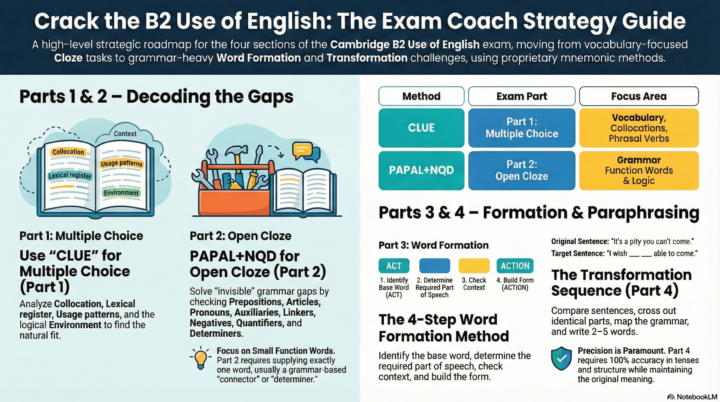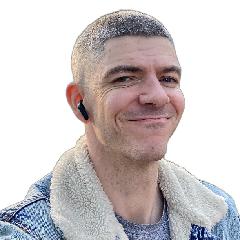Activity
Mon
Wed
Fri
Sun
Mar
Apr
May
Jun
Jul
Aug
Sep
Oct
Nov
Dec
Jan
Feb
What is this?
Less
More
Owned by Matthew
Clear methods. Less frustration. Better results. Exam prep made simple — by The Exam Coach.
Memberships
The AI Advantage
73.9k members • Free
AI Automation Society
257.9k members • Free
Warrior Society
214 members • Free
Skoolyard 🧃
827 members • Free
Men's Inner Circle
55 members • Free
English with Ross
54 members • Free
𝙂𝙊𝙊𝙎𝙄𝙁𝙔 🍓🐛🦋🌈⭐️🩷
11.2k members • Free
UNDETERRED
676 members • Free
Skool Speedrun
12k members • Free
74 contributions to The English Lab
The Exam Coach Breakdown!
Here's some more free material I've come up. Indulge!

The CLUE method explained!
The CLUE method is a strategic framework designed to help students navigate the Multiple Choice Cloze section (Part 1) of the B2 Use of English exam,. This section is particularly challenging because it presents four "real words" as options, where many may seem like synonyms, but only one fits the natural context. The CLUE method provides a checklist to move beyond simple translation and identify the correct word based on linguistic patterns,. The method breaks down into four specific areas of focus: C – Collocation The first step encourages students to ask if an option naturally "goes together" with surrounding words to form a fixed phrase or "chunk",. - How it helps: It eliminates words that might have the right meaning but the wrong pairing. For example, while "charge," "responsibility," and "control" relate to being in power, only "responsibility" naturally collocates in the phrase "take full responsibility for". - Application: Students are taught to look for the word they have seen before as a fixed unit in English. L – Lexical Meaning & Register This step helps students distinguish between near-synonyms by evaluating their formality (register) and precise nuance,. - How it helps: It prevents students from choosing words that are too vague or informal. For instance, in a formal committee context, the word "examine" is a more precise and appropriate choice than "look". - Shades of meaning: It also guides students to choose the word with the exact intended effect, such as selecting "beneficial" over general words like "good" or "great" when describing health effects. U – Usage Pattern This focuses on the grammatical requirements of a word, such as whether a verb requires a specific dependent preposition or follows a fixed structural pattern,. - How it helps: It narrows options based on the "particle" or preposition following the gap. For example, a student can identify the correct answer by knowing that "accused" must be followed by "of," whereas other options like "responsible" would require "for",. - Phrasal Verbs: It also helps navigate phrasal verb traps where multiple options might create real verbs (like set off or take off), but only one matches the specific usage needed for the sentence (like a plane leaving the ground),.
🟠 The English Lab | Part 1 Practice – Vocabulary in Context
Let’s ease back into exam thinking with a clean Part 1 question. Choose the correct option. Social media plays an important ___ in how we communicate today. A) part B) role C) place D) position 👉 Drop your answer in the comments. This is exactly how we train for Part 1 here.Short questions. Real exam language. Focus on how English is actually used, not on translating word by word. Exam coach Tip: Cambridge loves set phrases like this. The grammar is fine in more than one option, but only one fits naturally. Our job is to build the instinct to hear that difference quickly. We are using the start of the year to get back into the swing of things. Nothing intense. Just consistent practice and clear thinking. I’ll post the answer and explanation tomorrow.
1
0

Doubling Down
The previous post really had me in my feels and to be honest it was self aggrandizing rather than the truth I was avoid, I wasn't really giving this a chance. Some may say that I tried and for that you could be write and now what? It wasn't working the way I was doing it and it showed. Hardly any posts offering my value proposition or service, no course material and as a result no engagement. Well duh! You can't partially build the machine then cry about it not working. All this said, I don't have many skills outside of doing this particular thing with English because that's what I've spent my time earning a living and I've been good at it. The function of a business is to identify a problem, in this case passing the Use of English part of a Cambridge Exam, offering my proprietary solution to relieve the pain of failure. That's it. I know very few things but one of them is this exam and getting non-native English users to pass. You in?
2
0

Soul Searching
As some of you have noticed, I haven't been very active and to be honest I am not sure that this something people want to engage with. Even more so if I am not doing it and I am the community owner. I must confess that over the last few months my personal life has taken a nose dive and as much I do believe in this mission to help people pass this part of the exam, it was chore to do so. I think this community will now move in a direction that suits me a lot more. I thank you from the bottom of my heart if you were one of my friends who bought my sales pitch to join, but this will be changing soon. For all of you who know me, I am sure you'll figure out where I am going to go with this. If that works then I'll be doing the think I am more passionate about. For the rest of you, if you leave that's cool too. See you on the top. MZ

1-10 of 74
@matthew-zana-3823
I am Matt, father of five and teacher of English to most.
Active 2d ago
Joined Aug 20, 2025

